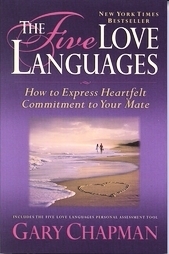Take a photo of a barcode or cover
1.84k reviews for:
The Five Love Languages: How to Express Heartfelt Commitment to Your Mate
Gary Chapman
1.84k reviews for:
The Five Love Languages: How to Express Heartfelt Commitment to Your Mate
Gary Chapman
fast-paced
I wish I had found this book many years ago. Although it would have made a tremendous impact on my past relationships, Chapman creates a powerful message for shaping your future ones. I love his approach to learning the love language of your partner. Even though couples think they are trying to hard, they just simply aren't feeling loved by the things their partner is doing or finding ways to act on their partner's style of affection. I've learned a lot about myself and my language and ways I can still embrace the language of others to form happy relationships
The premise here is good. The concept of love languages makes sense but the theory lacks nuance and the book only uses very clear cut examples to make the point. Every single couple mentioned has a big "ah ha!" moment and instantly changes their behavior which doesnt seem very plausible for most people. The advice also flirts a little too close to love bombing for my taste.
On top of all that the blatant gender stereotypes and the author's use of unwanted sex as an act of love really gave me the ick.
On top of all that the blatant gender stereotypes and the author's use of unwanted sex as an act of love really gave me the ick.
emotional
informative
reflective
medium-paced
I feel like anyone who is married should read this book. It's fundamental information that will help keep your marriage strong. It put to words many of my thoughts and feelings, and I think that I have a better understanding of myself and my spouse as well.
"A slap to the face is detrimental to any child, but it is devastating to a child whose primary love language is touch." (page 110)
I can see why this book is so well loved and why it's so heavily criticized. The above quote perfectly encapsulates the problem. The book has a generally excellent message - different people value different expressions of love differently - but often elevates that message to an absurd level that is understandably off-putting for many. If you take Chapman's lessons at face value, you'd come to think that people only need to be shown love in one way and no other matters.
Perhaps my favorite example of this was a story of a man who wasn't sure what his love language was, physical touch or words of affirmation. This led Chapman to ask the man, "If [your wife] were meeting your sexual needs... but she was giving you negative words, making critical remarks, sometimes putting you down in front of others, do you think you would feel loved by her?" (page 124) Of course, the man answered "no." This apparently meant that his primary love language was words of affirmation, which is an absurd conclusion. You don't have to value kind words to be negatively affected by mean ones. Similarly, I doubt that a person who values kind words will be thrilled with a spouse who says lovely things while never touching them, helping around the house, giving gifts, or spending time together. People aren't that simple even if this book might have you thinking otherwise.
For all that the book oversells its message, the general concept of love languages is a good one. I can see why so many have found it life changing. While I will argue that most of us need multiple languages spoken to us, it's also true that we usually don't need all of them. It's good to be reminded that others may put extreme value on the languages that we view as less important. For example, if you're someone who really adores getting gifts and your partner doesn't, then you can think that you're showering them with affection while they just see a slowly building pile of crap that they feel like they have to keep because it came from you. Having words to explain that disconnect is valuable, so I can't see the popularity of love languages as a terrible thing for the world. Anything that helps us connect with each other is a good thing, just don't take it to the author's absurd extremes.
I can see why this book is so well loved and why it's so heavily criticized. The above quote perfectly encapsulates the problem. The book has a generally excellent message - different people value different expressions of love differently - but often elevates that message to an absurd level that is understandably off-putting for many. If you take Chapman's lessons at face value, you'd come to think that people only need to be shown love in one way and no other matters.
Perhaps my favorite example of this was a story of a man who wasn't sure what his love language was, physical touch or words of affirmation. This led Chapman to ask the man, "If [your wife] were meeting your sexual needs... but she was giving you negative words, making critical remarks, sometimes putting you down in front of others, do you think you would feel loved by her?" (page 124) Of course, the man answered "no." This apparently meant that his primary love language was words of affirmation, which is an absurd conclusion. You don't have to value kind words to be negatively affected by mean ones. Similarly, I doubt that a person who values kind words will be thrilled with a spouse who says lovely things while never touching them, helping around the house, giving gifts, or spending time together. People aren't that simple even if this book might have you thinking otherwise.
For all that the book oversells its message, the general concept of love languages is a good one. I can see why so many have found it life changing. While I will argue that most of us need multiple languages spoken to us, it's also true that we usually don't need all of them. It's good to be reminded that others may put extreme value on the languages that we view as less important. For example, if you're someone who really adores getting gifts and your partner doesn't, then you can think that you're showering them with affection while they just see a slowly building pile of crap that they feel like they have to keep because it came from you. Having words to explain that disconnect is valuable, so I can't see the popularity of love languages as a terrible thing for the world. Anything that helps us connect with each other is a good thing, just don't take it to the author's absurd extremes.
informative
medium-paced
informative
medium-paced
What a well written, amazing book. This book led to so much understanding and meaningful conversations.
informative
fast-paced





